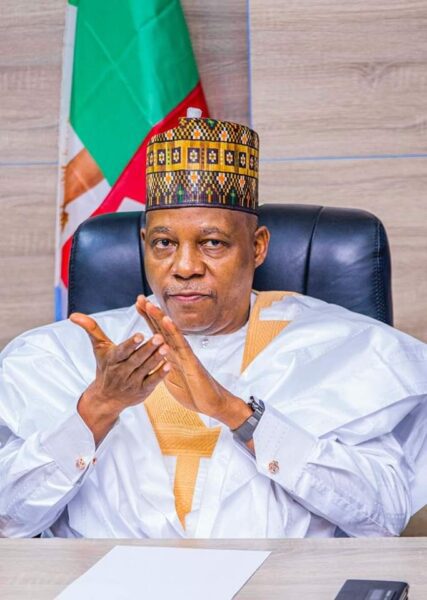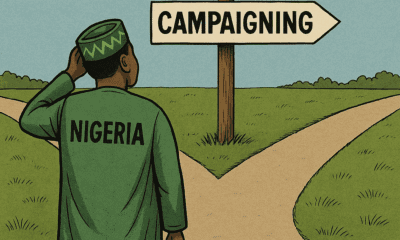Democracy & Governance
Shettima’s Moment: A Northern Voice Needed to Protect a Southern President and Stabilize a Shaken Nation -By Psychologist John Egbeazien Oshodi
Whether the stories of strain between President Bola Ahmed Tinubu and Vice President Kashim Shettima are truth, exaggeration, or the usual Abuja gossip, one reality rises above all rumour: Nigeria is hurting too deeply, bleeding too heavily, and trembling too violently for its two highest leaders to stand apart. This is not a season where distance can be afforded at the top. When a nation is this wounded, unity is not a luxury. It is oxygen.

Nigeria is entering one of the most volatile, emotionally draining, and strategically dangerous moments of its modern democratic life. The country is struggling to breathe beneath the crushing weight of escalating insecurity—school abductions that pierce the national conscience, extremist incursions that flatten entire communities, religiously charged violence that tears at the delicate fabric of coexistence, and a growing cloud of political uncertainty that fuels anxiety across the land. The atmosphere is not merely tense; it is trembling.
In a season like this, leadership cannot be symbolic. It cannot operate from a distance. It cannot whisper when the nation needs a steady, commanding voice. Nigeria requires leadership that is visible, grounded, and unafraid to stand where the crisis is burning hottest.
That is why the nation urgently needs Vice President Kashim Shettima—not as an assistant standing in the background, not as a ceremonial deputy who offers sympathy after the damage is done, but as a northern statesman with cultural weight, historical memory, and regional legitimacy. He is uniquely positioned to stabilize a crisis that is unfolding in territories he understands with a depth that no briefing, security report, or consultant analysis can reproduce.
This is not an attack on Shettima.
It is not a criticism.
It is a respectful summons.
A call to the highest version of him.
A call to the man shaped in adversity.
A call to the one leader in the Presidency whom history has already tested and trained in the hardest terrain imaginable.
Shettima was forged through fire—
and it is precisely that fire-forged leadership the nation now needs.
A Vice President Formed in Hard Terrain
To understand why Nigeria needs Kashim Shettima at the forefront of this moment, one must first understand the terrain that shaped him. He was born there. He was raised there. His worldview, his instincts, his political language, his understanding of fear and courage — all were formed in the deep social, cultural, and spiritual rhythms of the North. He does not merely represent the region; he speaks its emotional dialect, understands its unwritten codes, and feels its wounds in a way only a son of the soil can.
Anything said about Nigeria’s security architecture is incomplete without acknowledging that Shettima’s political life unfolded in one of the most dangerous human landscapes in Africa. Before he ever stepped onto the national stage, he spent four years in the federal cabinet learning the complexities of national governance. Then he assumed leadership of a state under siege — and remained its governor for eight unbroken years.
Those years were not defined by ribbon-cuttings or ceremonial projects. They were defined by funerals. By burnt villages. By grieving parents. By displaced families wandering from camp to camp. By the hollowed-out silence of communities emptied by fear. His governorship was a burden of blood and survival, not comfort or ease.
He governed through bombings that shattered marketplaces.
He governed through mass abductions that traumatized an entire generation.
He governed through the anxiety of nights broken by gunfire and dawns marked by fresh graves.
He governed through the haunting quiet of towns where life had fled and only memory remained.
This experience is not academic.
It is not theoretical.
It is engraved into his mind and spirit — a psychological imprint he cannot forget even if he tried.
And that is precisely why he is the one Nigeria needs now.
Because the North is entering another dangerous cycle, a cycle that requires not only formal authority but lived experience, cultural fluency, and emotional credibility. Shettima has all three — not from books, but from life.
Tinubu Needs Him — Not Because of Politics, But Because the Nation Does
Whether the stories of strain between President Bola Ahmed Tinubu and Vice President Kashim Shettima are truth, exaggeration, or the usual Abuja gossip, one reality rises above all rumour: Nigeria is hurting too deeply, bleeding too heavily, and trembling too violently for its two highest leaders to stand apart. This is not a season where distance can be afforded at the top. When a nation is this wounded, unity is not a luxury. It is oxygen.
People across the country feel a fear that sits in the chest like a stone. Parents send their children to school with prayers that choke in their throats. Travelers step onto the highway with resignation, not confidence. Entire communities sleep with one eye open, unsure of what the night will bring. In moments like this, Nigerians look to the Presidency for a sense of stability, for a sign that the centre is still holding.
This is why even the slightest whisper of disconnection between Tinubu and Shettima hits the public like a wound. Observers have spoken of uneven chemistry, thin trust, or hesitant alignment. These may be mild in private, but their impact in the national psyche is sharp. A divided home at the top becomes a divided country below. And right now, division is a danger Nigeria cannot afford.
This is where Shettima’s earlier sacrifice becomes emotionally powerful. In 2022, after securing a Senate victory in a region where democracy itself has been attacked, he chose to step aside—not for personal gain, not for regional pride, but to stand beside a Southern, non-Sharia, non-northern candidate. He did it because he understood what the country needed. He did it because he sensed the fragile mood of the North. He did it because he believed unity would hold the nation together.
That choice was not political routine.
It was courage.
It was responsibility.
It was an understanding of Nigeria’s heartbeat.
Today, that same courage is needed again—only this time, even more visibly, more strongly, and more boldly. Nigeria needs Shettima to step forward, not quietly, not symbolically, but as a transformative presence who steadies the presidency and reassures the country that division at the top will not become fracture on the ground.
Tinubu needs him.
Not in whispers.
Not from the shadows.
Not in moments of polite collaboration.
He needs him as the northern shield, the voice that calms a shaken region, the bridge that keeps old wounds from reopening and tearing the federation apart. He needs him as the partner who steps forward when the nation is gasping for air.
And the people—exhausted, frightened, traumatized—need that anchor even more.
They need to feel that the Presidency is united.
They need to feel that the North and South are holding hands.
They need to feel that the two most powerful men in the country breathe in the same direction.
In this painful hour, unity between Tinubu and Shettima is not a political arrangement.
It is a lifeline for a hurting nation.
Nigeria Is Moving Beyond the Era of Soft Responses
Shettima’s recent visit to Kebbi—where he spoke with trembling sincerity about the abduction of schoolgirls and paid solemn tribute to the late Brigadier-General Musa Uba—carried the right emotional tone. His words were human and presidential. When he said, “Kebbi’s pain is Nigeria’s pain. When one child is taken, every home grieves,” the nation felt the depth of his empathy.
But Nigeria has moved into a season where compassion alone can no longer hold back the rising tide of violence. The country is aching in ways condolences cannot soothe. It is weary in ways sympathy cannot mend. It is traumatized in ways prayer alone cannot heal. Nigerians—who once found comfort in the familiar rhythm of solidarity and spiritual language—now feel the ground shaking beneath them. They have reached the point where emotional reassurance no longer keeps danger away.
This is not a dismissal of prayer. Nigerians pray more than almost any nation on earth. They pray at dawn and dusk, in mosques and churches, in markets and buses, on their knees and on their feet. Prayer is the heartbeat of the people. But today, the nation is sending a more painful, more honest cry: prayer alone is no longer enough to stop what is happening.
Even the Pentecostal Fellowship of Nigeria, marking forty years of spiritual influence, declared openly that Christian communities are under siege. They acknowledged that prayer—though powerful—cannot shield abducted children, cannot push back armed herders, cannot stop militants who roam freely with weapons, cannot neutralize extremists now attacking with unchecked boldness. When faith leaders, usually the last to give up spiritual optimism, begin admitting their strongest weapon is no longer sufficient, the political message becomes thunderous.
The state must act.
The state must protect.
The state must step into its rightful place.
The state must demonstrate strength, not only sympathy.
And this is where the nation turns instinctively toward Shettima.
Not because he is the only leader who cares.
Not because others lack compassion.
But because he is the only federal figure who can give national security decisions a northern backbone.
His voice carries weight in the region where the crisis burns the fiercest.
His presence sends signals no minister can imitate.
His engagement tells a frightened North, “This is no longer business as usual. The federal government is fully present.”
Shettima has spent significant time on official overseas travel on behalf of the President, representing Nigeria at global events and diplomatic meetings. But in this moment, travel abroad must give way to travel north. The fires burning in the North are hotter than any international agenda. The North—not Europe, not America, not the Gulf—is the place where Nigeria’s unity will either hold or break.
If Shettima must travel, let every major journey be to the North.
Let him be seen speaking directly to governors.
Let him sit with traditional chiefs and elders.
Let him meet with emirs in closed and open sessions.
Let him visit mosques, not as a formality, but as a moral intervention.
Let him stand before families in communities where some extremist actors emerge.
Let him talk to the ulema, Sharia court leaders, youth groups, vigilante networks, and mothers who have watched their sons drift toward violence.
The North responds to presence—not press releases.
Only Shettima can carry the message that this fight is no longer distant policy, but personal, immediate, unavoidable. Only he can communicate authority in a way that resonates with a region shaped by its own cultural codes, spiritual sensitivities, and historical memory.
The time for soft responses has passed.
The time for hopeful language has passed.
The time for sympathetic tears has passed.
Nigeria has reached the point where leadership must not only comfort the wounded, but confront the wound.
And Shettima—shaped by the fire he governed through, trained by the terror he confronted, seasoned by the suffering he witnessed—is the one best positioned to turn national compassion into national action. His presence can stabilize fear. His voice can steady a trembling region. His leadership can transform empathy into resolve.
Nigeria is no longer asking him to advise from a distance.
It is calling him to stand at the center of the storm.
Because survival now depends not on soft reassurance, but on firm leadership.
And Shettima is the northern anchor the nation needs in this hour of danger.
The Burden of the Sharia-State Reality
There is a quiet truth in Nigeria’s current political climate, one that many citizens sense even if leaders rarely say it aloud: President Tinubu is being exceedingly cautious when it comes to speaking firmly about the Sharia-northern states and their governors. He knows how sensitive that terrain is. He knows how quickly a firm statement can be twisted into regional hostility. He knows the North listens differently when the voice is from the South. And because of this, he often walks on eggshells.
But Shettima does not need eggshells.
He does not need translators.
He does not need advisers to interpret northern emotions for him.
He grew up in the soil where Sharia politics breathe.
He was shaped by the same cultural winds that shape northern leadership.
He speaks the language beneath the language — the tone, the caution, the pride, the coded expectations.
He understands the cultural and legal psychology of the Sharia states in a way no other federal figure can. He knows the unwritten rules that govern the region. He understands the quiet pressure placed on northern governors to appear unshakeable before their people. He recognizes the delicate blend of faith, tradition, and political survival that informs their decisions. He knows how religious legitimacy is sometimes used to mask abuses, how leaders fear being viewed as weak, or influenced by Western demands, or disloyal to the cultural hierarchy.
He also understands something deeper — the long-standing northern belief that certain actions will never draw real consequences, that global powers will hesitate to confront Sharia states directly, that the North operates under an invisible shield of untouchability.
But that shield is cracking.
Not because Nigeria wants it to.
Not because the South is pushing it.
Not because activists are shouting.
It is cracking because the world is now watching with a level of intensity the North has not experienced before.
International pressure is rising.
The United States Congress is openly discussing internal northern practices.
The global community is no longer silent about religiously motivated abuses.
Human rights expectations are being enforced not just diplomatically, but politically and militarily.
Reality is about to hit the region — hard.
Tinubu cannot walk into that storm without triggering resistance.
He cannot confront Sharia governors directly without risking political upheaval.
He cannot push too strongly without creating the perception of southern aggression.
But Shettima can.
Because the North knows him.
Because its leaders trust his background.
Because his voice carries cultural legitimacy.
Because he understands the pride and the pain behind northern decisions.
Because he can speak firmly without being accused of attacking the region.
This is insider knowledge turned into national necessity — something no southern leader, no minister, and no federal technocrat can navigate with the same authority.
And the moment for him to use it has arrived.
America Has Drawn a Line — And Shettima Knows What That Means
For the first time in Nigeria’s democratic history, the United States Congress has openly placed conditions on any future military partnership with Nigeria. Not vague warnings. Not diplomatic suggestions. Not polite concern. Actual conditions.
Condition one: Release Sunday Jackson, the Adamawa farmer sentenced to death for defending himself against an armed attacker.
Condition two: Present a real, enforceable, and fully committed plan to disarm the radical herder militias terrorizing the Middle Belt.
This is not diplomacy.
This is leverage.
This is pressure.
This is the world saying, “Enough.”
Congressman Riley Moore stated what millions of Nigerians whisper in fear: militants roam freely with weapons, victims who defend themselves are sentenced to die, and the Nigerian system often looks away when certain groups break the law. He said the double standard must end before America will even consider security cooperation.
This is international humiliation.
A global indictment.
A warning shot aimed squarely at the political structure of the North.
And this time, the spotlight is not soft.
It is harsh, bright, and unforgiving.
Because it is not just Moore.
Across Washington, powerful voices are rising.
Senator Ted Cruz has pushed forward the Nigeria Religious Freedom Accountability Act of 2025, a bill designed to impose sanctions on Nigerian officials who enforce or support Sharia and blasphemy laws that violate human rights norms. This is the same American senator known for taking on China over religious persecution — and now he is turning that same intensity toward Nigeria.
Christian persecution reports are being read on Capitol Hill.
Northern court rulings are being scrutinized.
Sharia-state practices are being debated in international committees.
And Nigeria’s internal contradictions are being placed under a global microscope.
The North has long acted as though international actors would never touch Sharia issues, would never impose consequences, would never challenge local legal traditions. But that era is gone.
Washington is circling the issue.
Bipartisan attention is growing.
Human rights organizations are mobilizing.
American conservatives, evangelicals, Republicans, Democrats — all are converging on one point: the religious and ethnic violence in Nigeria is no longer a domestic matter.
Only one federal leader understands every emotional, religious, cultural, and political layer of this storm.
Shettima.
Only he can speak to northern governors without triggering rebellion.
Only he can tell religious forces that the world is watching.
Only he can navigate the fragile pride of the region without setting it aflame.
Only he can interpret the weight of Washington’s anger without miscommunicating the message.
Because if this moment is mishandled, the consequences will not stop at diplomatic notes.
Sanctions will follow.
Restrictions will follow.
International isolation will follow.
And Nigeria’s internal fractures will deepen.
America has drawn a line.
And Shettima knows exactly what it means when a global power stops whispering and starts writing conditions into law.
This is no longer the time for silence.
It is the time for strategy — and only he has the credibility to execute it.
Shettima Knows the Consequences of CPC and Other Sanctions Acts
If there is anyone in the Nigerian Presidency who understands exactly what is coming, it is Kashim Shettima. He has watched how the United States has treated other nations placed under the CPC designation — the “Country of Particular Concern” status for severe religious-freedom violations. He knows the implications of being placed under Acts like the International Religious Freedom Act, the Global Magnitsky Act, and the new Religious Freedom Accountability Bill being pushed in the U.S. Senate.
He knows these laws do not punish countries vaguely.
They punish individuals directly.
They sanction governors.
They sanction commissioners.
They sanction judges.
They sanction security officials.
They block visas, freeze assets, restrict travel, limit financial transactions, and blacklist political figures from global platforms.
Shettima knows this because the North has watched other nations fall under these measures — Eritrea, Pakistan, Myanmar, Sudan, China, Iran. He understands that once the U.S. formally labels Nigeria as a CPC nation, the next step is targeted sanctions against the officials responsible for abuses, including those enforcing extreme Sharia rulings or turning a blind eye to religiously motivated violence.
He knows that the United States does not bluff on this issue.
He knows that once Congress moves, the State Department follows.
He knows that once the State Department acts, the Treasury Department begins to investigate individuals.
He knows that once Treasury steps in, the consequences become personal.
He knows that northern governors who think they are untouchable will suddenly find themselves unable to travel, unable to bank abroad, unable to access Western systems, and unable to escape the international spotlight. He knows that judges who issue death sentences based on selective religious laws may be named publicly. He knows that security officials who ignore attacks on Christian communities may be placed on sanctions lists.
He knows all of this because he has spent years engaging the international community.
He has seen the reports.
He understands the diplomatic signals.
And he is aware that Washington’s patience is gone.
Tinubu cannot confront Sharia-state leaders on this without igniting political backlash.
But Shettima can quietly warn them.
He can explain the severity.
He can show them what is written in these Acts.
He can make them understand that the consequences will not be theoretical — they will be personal, global, and irreversible.
He knows that once sanctions begin, there is no political spin capable of reversing them.
He knows that now is the moment to act.
Time Is Running — Trump Is Angry, And Nigeria Must Act
Time is not on Nigeria’s side. The country has entered one of the most dangerous diplomatic moments in its history, layered on top of a brutal insurgency and a collapsing economic climate. U.S. President Donald Trump has escalated his rhetoric sharply, calling Nigeria a “disgraced country,” threatening to halt all aid, and instructing the Pentagon to prepare for possible military involvement. His warnings are no longer hints; they are declarations broadcast across the world with unmistakable intent.
He stated that if Nigeria continues to “allow the killing of Christians,” the United States may enter the country “guns-a-blazing” to wipe out the terrorists responsible. This is not diplomatic caution. This is a superpower expressing anger, impatience, and willingness to act unilaterally.
Nigeria cannot pretend that these warnings will evaporate.
They will not.
And with Nigeria’s economy already in free fall — the naira sinking, inflation crushing families, unemployment rising, and public morale at its lowest point in years — the nation cannot absorb the shock of sanctions, military tension, or international intervention.
This is why Vice President Kashim Shettima must step forward now in full force.
Not quietly.
Not symbolically.
Not from a distance.
If he truly wants to support a southern president who is overwhelmed by a northern insurgency, he must be present in the North physically and politically. He must show governors that the federal government is not whispering from Abuja, but standing beside them, confronting them, guiding them, and calming them. He must speak to emirs, Sharia court judges, and ulema in the language of legitimacy they understand. He must build a consensus that only he can build, because only he carries the cultural authority to command northern attention at this critical hour.
This is not punishment.
This is strategic deployment.
This is national survival.
Because if Trump acts, the consequences will not remain on American screens. They will strike Nigerian institutions directly. They will break the illusion of impunity. They will destabilize local leadership. They will shake security structures. They will crush an already struggling economy. And they will deepen public suffering in ways Nigeria is not prepared for.
Shettima knows this.
He knows how quickly Washington can move when anger becomes policy.
He knows sanctions do not negotiate.
He knows foreign militaries do not wait for explanations.
He knows the shield that once protected parts of the North is no longer intact.
He knows that the window to act is closing.
And let it be said clearly: this psychologist is not against Shettima. Far from it. I write with the weight of national trauma in mind, not personal criticism. I have studied the emotional collapse of nations and the psychological cost of insecurity. I see the panic in communities, the despair in parents, the silence in classrooms, the fear on highways. I know Nigeria is standing on a cliff.
I write because Shettima is one of the few leaders whose voice can still steady the North.
I write because he has the regional legitimacy to guide governors.
I write because his life experience gives him credibility Tinubu cannot borrow.
I write because this hour requires a northern statesman, not a southern directive.
This appeal is not a blow against him.
It is a summons to the strongest version of him — the Shettima shaped by fire, disciplined by crisis, and seasoned by years of confronting fear in its rawest form.
Nigeria is trembling.
America is watching.
Time is closing.
And the nation needs him now — fully, visibly, courageously, and without hesitation.
This is his moment to rise.
Time Is Running — Trump Is Angry, And Nigeria Must Act
Time is not on Nigeria’s side. The nation has entered one of the most dangerous diplomatic moments in its modern history, layered atop a brutal insurgency and an economy gasping for air. U.S. President Donald Trump has escalated his rhetoric to a level no Nigerian administration has faced before—calling Nigeria a “disgraced country,” threatening to halt all aid, and directing the Pentagon to prepare for possible military action.
These are not careless remarks made in passing.
They are deliberate signals from a superpower that has lost patience.
Trump stated clearly that if Nigeria continues to “allow the killing of Christians,” the United States “may very well go into that disgraced country, guns-a-blazing,” to eliminate the terrorist networks. These are not hints. They are declarations of anger, force, and readiness to act unilaterally.
Nigeria cannot pretend these warnings will evaporate with time.
They will not.
The world is watching a nation on edge.
And with Nigeria’s economy already in collapse—soaring inflation, collapsing naira, food insecurity spreading, unemployment rising, public trust disintegrating—the country cannot survive the blow of sanctions, military tension, or foreign intervention. One wrong move could fracture the economy beyond recovery.
This is precisely why Vice President Kashim Shettima must step forward now in full force.
Not softly.
Not symbolically.
Not from the safety of Abuja.
If Shettima truly wants to support a southern president overwhelmed by a northern insurgency, he must be in the North physically and politically. He must stand in front of northern governors, not behind them. He must sit with emirs, Sharia court leaders, and ulema in private and public settings. He must absorb the tension they carry, calm the fear they feel, and challenge the silent complicity he understands better than anyone else in government.
He must visit mosques—not as a politician seeking applause, but as a statesman issuing a moral and existential warning.
He must engage the elders and families from which some extremist actors emerge.
He must speak to the region in the language of authority, dignity, and urgency they trust.
Only Shettima can do this.
Not a minister.
Not a southerner.
Not a federal spokesman.
Only him.
Because the North does not respond to press releases.
It responds to presence.
This is not punishment.
It is strategic deployment.
It is national survival.
Because if Trump acts, the consequences will not be distant headlines. They will hit Nigeria’s fragile institutions directly. They will break the illusion that certain regions are shielded from accountability. They will shake the authority of governors. They will expose the hidden contradictions in northern politics. And they will devastate an economy that is already sinking into desperation.
And Shettima knows this.
He knows how fast Washington can move when anger becomes policy.
He knows sanctions do not negotiate.
He knows the CPC and other Acts targeting Sharia-related abuses are real and enforceable.
He knows the era of northern untouchability is ending.
He knows Trump is unpredictable, and this window is closing rapidly.
Let it also be said clearly: this psychologist is not against Shettima. Far from it.
I write from a place of national concern, not political bitterness. I write as someone who sees the psychological collapse of communities, the trauma in classrooms, the grief in homes, the fear in villages, the distrust spreading across regions. Nigeria is shivering under the weight of insecurity, and the emotional fabric of this nation is tearing.
I write because Shettima is one of the only leaders whose voice still carries northern authority.
I write because he knows the terrain—culturally, religiously, politically, emotionally.
I write because his presence in the North is not optional; it is essential.
I write because without him, Tinubu’s southern presidency cannot survive a northern firestorm.
I write because this moment demands courage, not caution.
He must be seen with governors.
He must be seen with traditional rulers.
He must be seen with victims’ families.
He must be seen with religious leaders.
He must be seen addressing communities where fear and denial coexist.
He must be seen confronting the internal contradictions no one else dares touch.
This is not an attack on Shettima.
It is a summons to the strongest version of him.
Nigeria is trembling.
America is watching.
Time is closing.
The economy is collapsing.
And the nation needs him now—fully, visibly, courageously, and without hesitation.
This is his moment to rise.
About the Author
Prof. John Egbeazien Oshodi is an American psychologist and educator with expertise in forensic, legal, clinical, cross-cultural psychology, public ethical policy, police, and prison science.
A native of Uromi, Edo State, Nigeria, and son of a 37-year veteran of the Nigeria Police Force, he has dedicated his professional life to bridging psychology with justice, education, and governance. In 2011, he played a pioneering role in introducing advanced forensic psychology to Nigeria through the National Universities Commission and Nasarawa State University, where he served as Associate Professor of Psychology.
He currently serves as contributing faculty in the Doctorate in Clinical and School Psychology at Nova Southeastern University; teaches across the Doctorate Clinical Psychology, BS Psychology, and BS Tempo Criminal Justice programs at Walden University; and lectures virtually in Management and Leadership Studies at Weldios University and ISCOM University. He is also the President and Chief Psychologist at the Oshodi Foundation, Center for Psychological and Forensic Services, United States.
Prof. Oshodi is a Black Republican in the United States but aligns with no political party in Nigeria—his allegiance is to justice alone. On the matters he writes about, he speaks for no one and represents no side; his voice is guided solely by the pursuit of justice, good governance, democracy, and Africa’s advancement. He is the founder of Psychoafricalysis (Psychoafricalytic Psychology)—a culturally rooted framework that integrates African sociocultural realities, historical awareness, and future-oriented identity. A prolific thinker and writer, he has produced more than 500 articles, several books, and numerous peer-reviewed works on Africentric psychology, higher education reform, forensic and correctional psychology, African democracy, and decolonized models of therapy.










